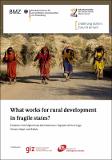| dc.contributor.author | Schultze-Kraft, Markus | |
| dc.contributor.author | Rew, Martin | |
| dc.contributor.author | Kuss, Maria Klara | |
| dc.coverage.spatial | Afghanistan | en_GB |
| dc.coverage.spatial | The Democratic Republic of the Congo | en_GB |
| dc.coverage.spatial | Yemen | en_GB |
| dc.coverage.spatial | Nepal | en_GB |
| dc.coverage.spatial | Bolivia | en_GB |
| dc.date.accessioned | 2014-05-30T14:21:45Z | |
| dc.date.available | 2014-05-30T14:21:45Z | |
| dc.date.issued | 2014-05 | |
| dc.identifier.citation | Schultze-Kraft, M., Rew, M. and Kuss, M.K. (2014) What works for rural development in fragile states? Evidence from Afghanistan, the Democratic Republic of the Congo, Yemen, Nepal and Bolivia. Eschborn: Deutsche Gesellschaft für Internationale Zusammenarbeit (GIZ) GmbH | en_GB |
| dc.identifier.uri | https://opendocs.ids.ac.uk/opendocs/handle/20.500.12413/3949 | |
| dc.description.abstract | Rural development in many fragile and conflict affected countries represents both a major challenge and an absolute must. The empirical evidence from five countries in South Asia, the Arabian Peninsula, Sub-Saharan Africa and South America (Afghanistan, Nepal, Yemen, the Democratic Republic of the Congo, and Bolivia) presented in Study I shows the major challenges rural development encounters in fragile settings. | en_GB |
| dc.language.iso | en | en_GB |
| dc.publisher | Deutsche Gesellschaft für Internationale Zusammenarbeit (GIZ) GmbH | en_GB |
| dc.rights.uri | http://www.ids.ac.uk/files/dmfile/IDSOpenDocsStandardTermsOfUse.pdf | en_GB |
| dc.subject | Governance | en_GB |
| dc.subject | Rural Development | en_GB |
| dc.subject | Security and Conflict | en_GB |
| dc.title | What works for rural development in fragile states? Evidence from Afghanistan, the Democratic Republic of the Congo, Yemen, Nepal and Bolivia. | en_GB |
| dc.type | Other | en_GB |

